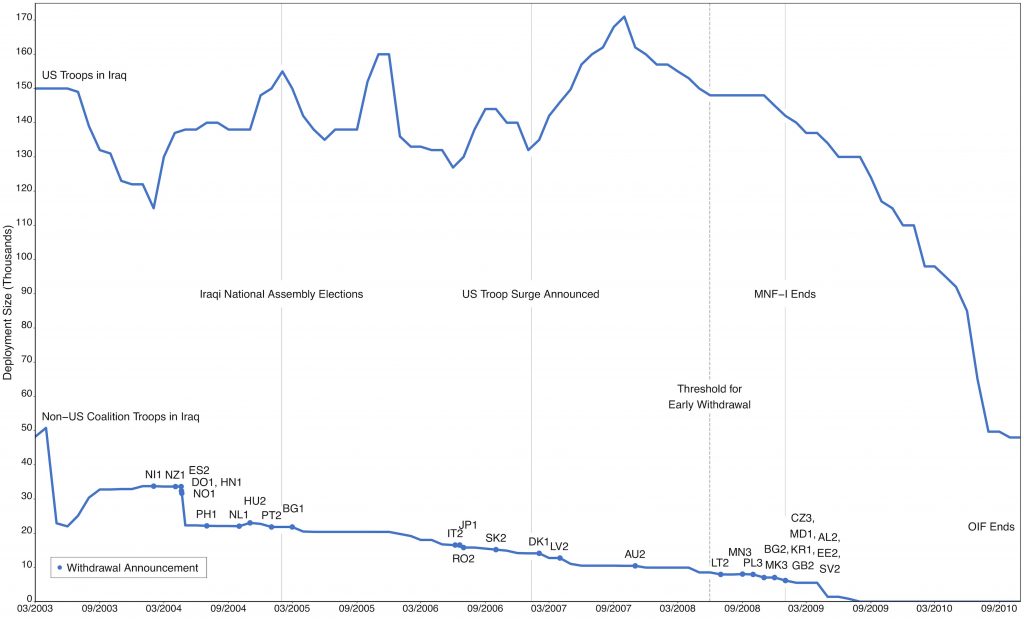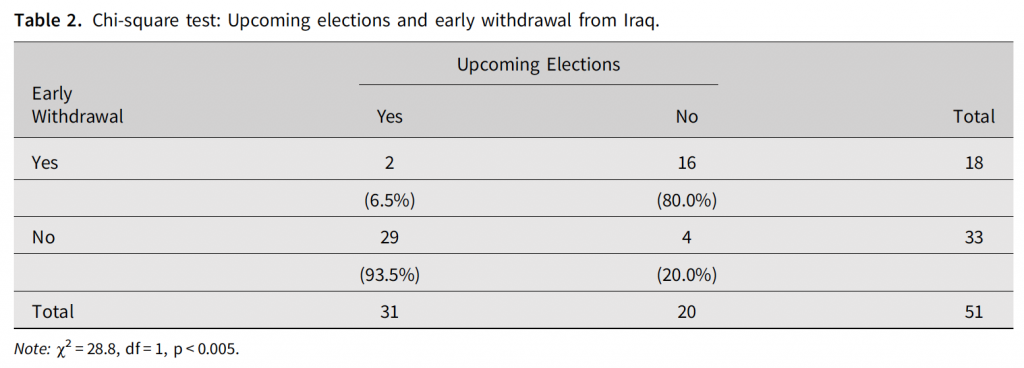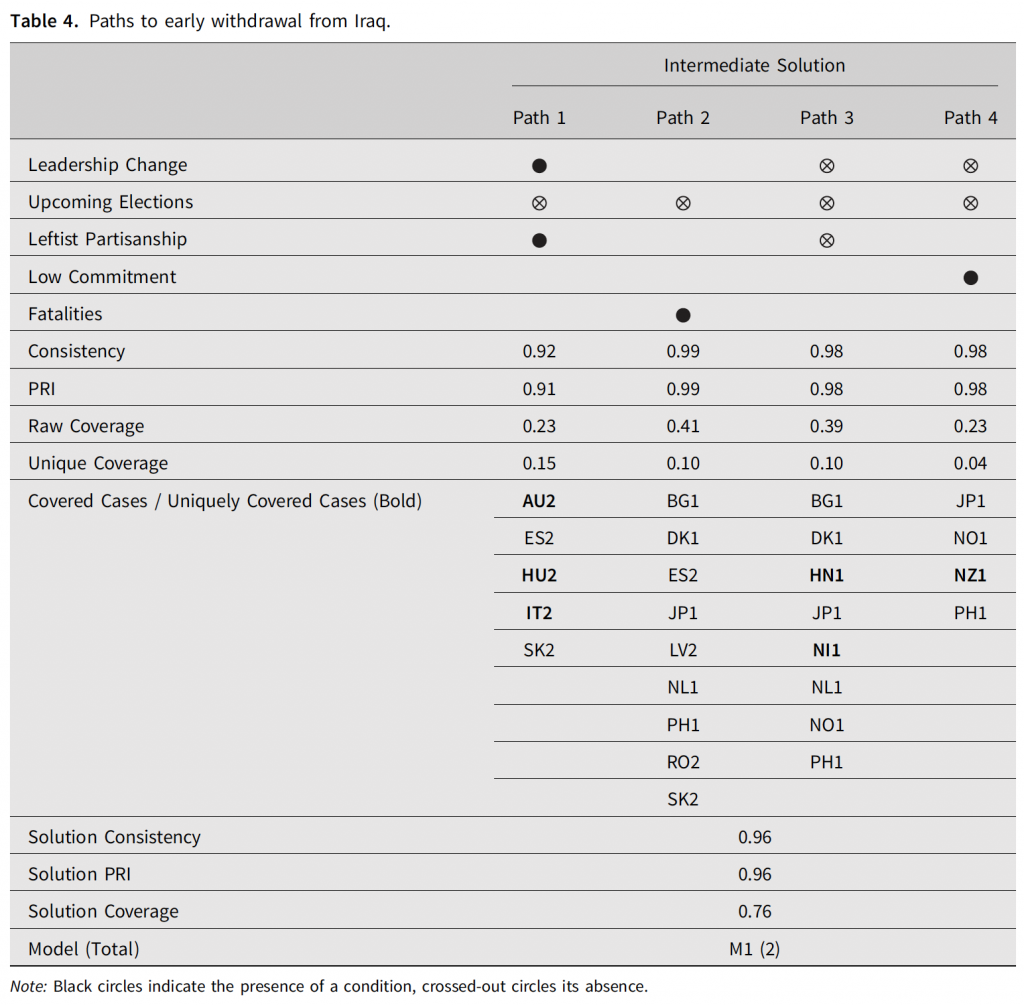Am 22. April 2021 habe ich an der Zeppelin Universität am Lehrstuhl für Global Governance von Prof. Andrea Schneiker einen virtuellen Gastvortrag zum Thema “Democracy and War Involvement” gehalten. Nach einem Überblick zu Kriegsbeteiligungen westlicher Demokratien in den vergangenen Jahrzehnten lag der Schwerpunkt auf meiner vergleichenden Studie zum Abzug aus dem Irakkrieg, welche Bedingungen für den Abzug bzw. Verbleib westlicher Regierungen im Irak identifiziert (51 Regierungen aus 29 Demokratien im Zeitverlauf, 2003-2008). Herzlichen Dank an Prof. Andrea Schneiker und das Lehrstuhlteam für die Einladung und an die teilnehmenden Studierenden für die sehr engagierte Diskussion! Der Artikel im European Journal of International Security ist 2020 erschienen und frei verfügbar (open access). Eine Zusammenfassung findet sich im EJIS-Blog.
Tag: Iraq War
-
Democracies and Withdrawal from Iraq
Open Access Article Published in EJIS
The February 2020 issue (5:1) of the European Journal of International Security (Cambridge University Press) features the article “Paths towards Coalition Defection: Democracies and Withdrawal from the Iraq War“. The study examines democratic war involvement in Iraq across 51 leaders from 29 countries. The article is the first QCA study that covers the entire period of coalition operations in Iraq, from 2003 until 2010, across all democratic governments that were involved in the multinational coalition. Among other findings, the article challenges some previous studies’ results on the effects of leadership turnover and electoral incentives (here and here). The set-theoretic analysis documents causal heterogeneity, where multiple paths lead towards coalition defection and leadership turnover only brought about the outcome of coalition withdrawal when combined with specific other conditions. For electoral incentives, contrary to expectations derived from prior studies, it could not be shown that upcoming elections were associated with coalition defection. Finally, the article documents the importance of casualties and prior commitment as factors that had previously been neglected. Replication data is hosted a Harvard Dataverse (R script, data, supplement).
Abstract: Despite widespread public opposition to the Iraq War, numerous democracies joined the US-led multinational force. However, while some stayed until the end of coalition operations, and several increased their deployments over time, others left unilaterally. How to explain this variation?
While some studies suggest that democratic defection from security commitments is primarily motivated by electoral incentives or leadership change, scholars have not reached a consensus on this issue. To account for the complex interplay between causal factors, this article develops an integrative theoretical framework, using fuzzy-set Qualitative Comparative Analysis (QCA) on original data on the Iraq War involvement of 51 leaders from 29 democracies.
The findings document the existence of multiple paths towards coalition defection. Among others, the results show that: (1) leadership change led to early withdrawal only when combined with leftist partisanship and the absence of upcoming elections; (2) casualties and coalition commitment played a larger role than previously assumed; and (3) coalition defection often occurred under the same leaders who had made the initial decision to deploy to Iraq, and who did not face elections when they made their withdrawal announcements.
Reference:
Mello, Patrick A. (2020) Paths towards Coalition Defection: Democracies and Withdrawal from the Iraq War, European Journal of International Security 5 (1): 45-76 (https://doi.org/10.1017/eis.2019.10)




-
Paths towards Coalition Defection
Article Published in the European Journal of International Security
The European Journal of International Security (Cambridge University Press) has published a first view version of “Paths towards Coalition Defection: Democracies and Withdrawal from the Iraq War“. The open access article PDF is available here. Replication data is hosted a Harvard Dataverse (R script, data, supplement). The article examines democratic war involvement in Iraq across 51 leaders from 29 democracies. It is the first set-theoretic study that covers the entire time frame of coalition operations, from 2003 until 2010. Its counter-intuitive findings document the existence of multiple paths towards coalition defection, emphasizing the importance of casualties and prior commitment. The European Journal of International Security (EJIS), founded in 2016, aims to publish “the cutting-edge of security research”, taking a cross-disciplinary approach that seeks to cover all areas of international and global security. EJIS is a journal of the British International Studies Association (BISA).
Abstract: Despite widespread public opposition to the Iraq War, numerous democracies joined the US-led multinational force. However, while some stayed until the end of coalition operations, and several increased their deployments over time, others left unilaterally. How to explain this variation? While some studies suggest that democratic defection from security commitments is primarily motivated by electoral incentives or leadership change, scholars have not reached a consensus on this issue. To account for the complex interplay between causal factors, this article develops an integrative theoretical framework, using fuzzy-set Qualitative Comparative Analysis (QCA) on original data on the Iraq War involvement of 51 leaders from 29 democracies. The findings document the existence of multiple paths towards coalition defection. Among others, the results show that: (1) leadership change led to early withdrawal only when combined with leftist partisanship and the absence of upcoming elections; (2) casualties and coalition commitment played a larger role than previously assumed; and (3) coalition defection often occurred under the same leaders who had made the initial decision to deploy to Iraq, and who did not face elections when they made their withdrawal announcements.
-
EISA Workshops Groningen 2018
From 6-9 June 2018, I attended the 5th EISA European Workshops in International Studies (EWIS) at the University of Groningen in the Netherlands. The EWIS format of the European International Studies Association allows scholars to engage in sustained, in-depth discussion over the course of several days, which makes them ideal to explore new topics and ideas. I participated in the workshop “The Politics of Foreign Policy Change – The Role of Policy Entrepreneurs”, co-organized by Tim Haesebrouck and Jeroen Joly (both Ghent University, Belgium). I presented a paper on “Leaders and the Politics of Foreign Policy Change”. The workshop comprised contributions from a group of 14 researchers from Belgium, Brazil, France, Germany, Italy, Lithuania, the Netherlands, and the United States. The workshop program can be accessed here.
-
Parliamentary peace or partisan politics?
Parliamentary peace or partisan politics? Democracies’ participation in the Iraq War
Abstract: “This paper seeks to explain democracies’ military participation in the Iraq War. Prior studies have identified institutional and partisan differences as potential explanatory factors for the observed variance. The interaction of institutions and partisanship, however, has gone largely unobserved. I argue that these factors must be analyzed in conjunction: institutional constraints presume actors that fulfill their role as veto players to the executive. Likewise, partisan politics is embedded in institutional frames that enable or constrain decision-making. Hence I suggest a comparative approach that combines these factors to explain why some democracies joined the ad hoc coalition against Iraq and others did not. To investigate the interaction between institutions, partisanship and war participation I apply fuzzy-set Qualitative Comparative Analysis (fsQCA). The analysis reveals that the conjunction of right-of-center governments with an absence of both parliamentary veto rights and constitutional restrictions was sufficient for participation in the Iraq War. In turn, for countries where the constitution requires parliamentary approval of military deployments, the distribution of preferences within the legislature proved to be decisive for military participation or non-participation.“
Keywords: democratic peace; fuzzy sets; institutional constraints; Iraq War; QCA
Mello, Patrick A. (2012) Parliamentary Peace or Partisan Politics? Democracies’ Participation in the Iraq War, Journal of International Relations and Development 15:3, 420-53 [More Information]